People met in hotel lobbies
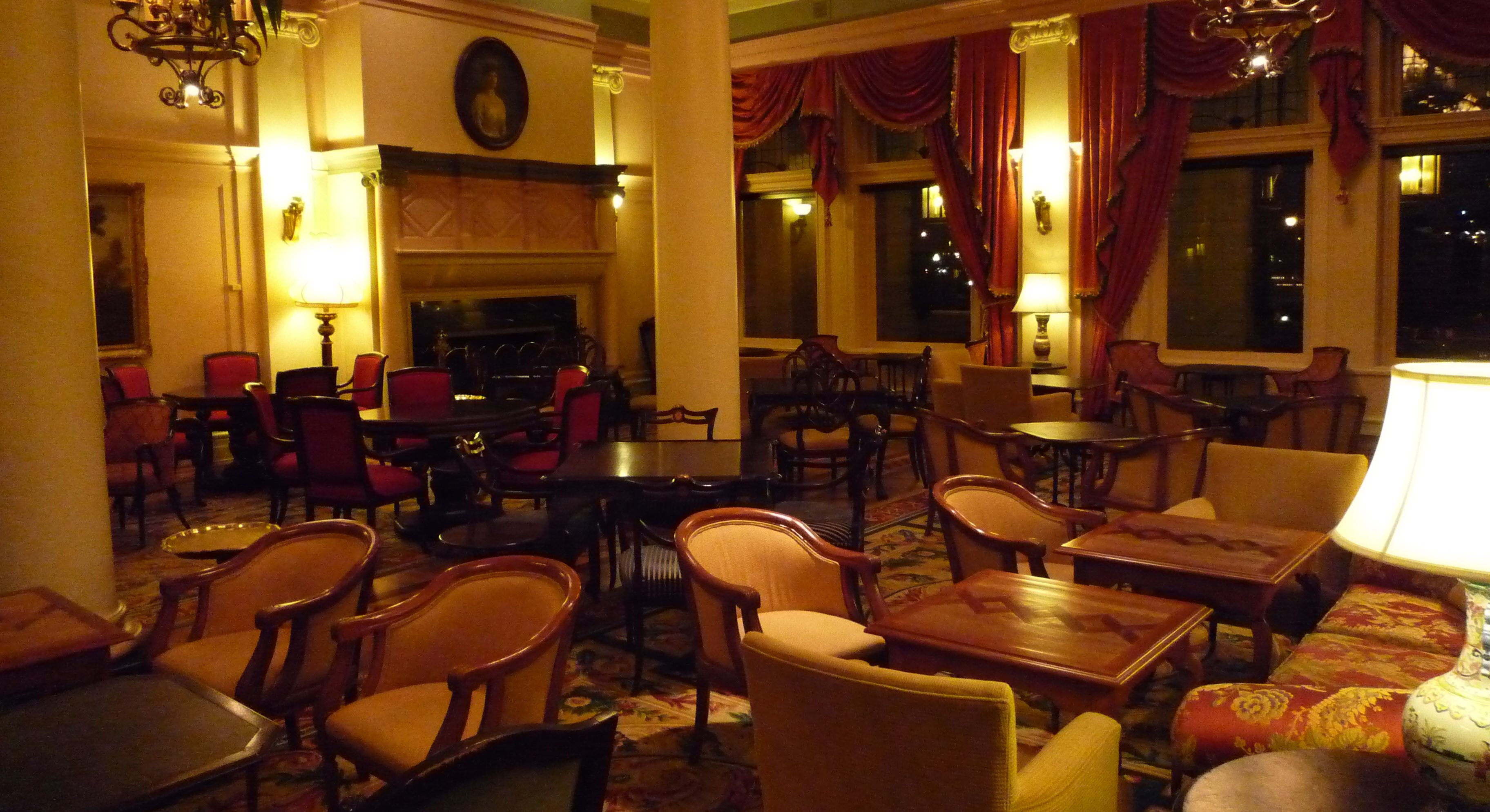
The Tea Lobby, which hosts the long-standing Afternoon Tea at The Fairmont Empress, Victoria, British Columbia, Canada. Photo credit: Bobak Ha’Eri. Licensed under CC BY-SA 3.0.
One of the pleasures of digging through old newspapers is the way you occasionally stumble across something that illustrates just how foreign a country the past really is.
In the late 19th and early 20th centuries, the Washington Post ran a regular column under the charmingly Victorian title “People Met in Hotel Lobbies.”

(Or “Heard in Hotel Lobbies,” or “Men in Hotel Lobbies,” or just “In Hotel Lobbies.” The title floated around a bit over the years. But you get the idea.)
The premise of the column was pretty simple. Back then, before travel became a thing that the unwashed masses did on a regular basis, coming and going through hotel lobbies was the sort of thing that marked a person out as someone of significance, as a Man of Affairs. So the Post had reporters whose job was simply to hang out in the lobbies of the city’s fashionable hotels, interviewing anybody who happened to walk by, on the theory that if you were the sort of person who would be walking through a hotel lobby your opinions were probably worth recording.
Was that theory right? Having read through a fair few of these columns, I can report to you, Dear Reader, that it was not. This was before two World Wars made Washington the capital of the free world, and the people who pass through “In Hotel Lobbies” are for the most part dreary bores pursuing the sorts of business one would pursue in the provincial capital of a provincial nation: businessmen seeking adjustments to this law or that tariff, boosters of development projects trying to drum up backing for their latest scheme, local political nabobs come to kiss their party leaders’ rings.
They’re not all dross, though. Digging through the archives, every now and then you stumble across a story that jumps out at you. Some feature confident predictions that we in the far future know will turn out to be spectacularly right (or spectacularly wrong); others say more about their subject than either the reporter or interviewee realizes; others are simply warm, relatable human interest stories. Taken together, they provide a fascinating portrait of Washington life in the long, slow sunset of the Gilded Age.
I haven’t been able to review them all — the column ran for many years, and at its height was a daily feature, so there simply hasn’t been enough time. I wanted to give you a sample, though, so I’ve read through the “In Hotel Lobbies” columns published in 1889 and 1890 and picked out a few to highlight here. (If you’d like to read more, ask your local library if they have access to ProQuest’s Historical Newspapers database, which includes all issues of the Post published between 1877 and 2000.)
November 28, 1889: Chicago tailor A.M. Denny wants you to understand that American-made clothes are every bit as good as those made in England, thank you very G-D much.
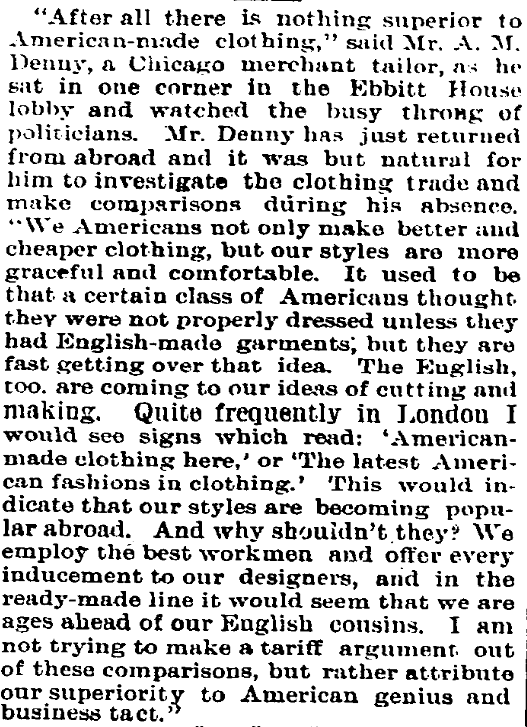
Excerpt from “Heard in Hotel Lobbies,” The Washington Post, November 28, 1889.
“After all there is nothing superior to American-made clothing,” said Mr. A. M. Denny, a Chicago merchant tailor, as he sat in one corner of the Ebbitt House lobby and watched the busy throng of politicians. Mr. Denny has just returned from abroad and it was but natural for him to investigate the clothing trade and make comparisons during his absence. “We Americans not only make better and cheaper clothing, but our styles are more graceful and comfortable. It used to be thought that a certain class of Americans thought they were not properly dressed unless they had English-made garments, but they are fast getting over that idea. The English, too, are coming to our ideas of cutting and making. Quite frequently in London I would see signs which read: ‘American-made clothing here,’ or ‘The latest American fashions in clothing.’ This would indicate that our styles are becoming popular abroad. And why shouldn’t they? We employ the best workmen and offer every inducement to our designers, and in the ready-made line it would seem that we are ages ahead of our English cousins. I am not trying to make a tariff argument out of these comparisons, but rather attribute our superiority to American genius and business tact.”
November 29, 1889: M.L. Parvin, “a bright mulatto” of New Orleans, argues a way forward for African-Americans that would be echoed in Booker T. Washington’s “Atlanta Compromise” six years later.
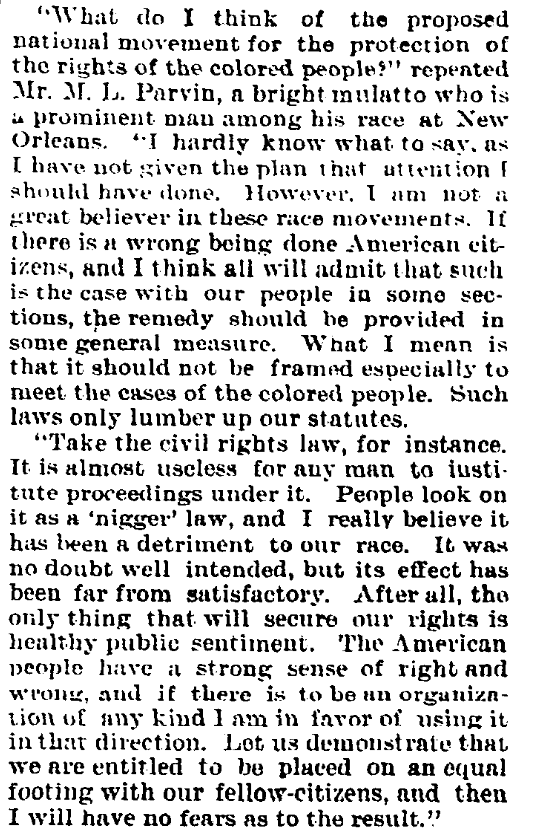
Excerpt from “Heard in Hotel Lobbies,” The Washington Post, November 29, 1889.
“What do I think of the proposed national movement for the protection of the rights of the colored people?” repeated Mr. M. L. Parvin, a bright mulatto who is a prominent man among his race at New Orleans. “I hardly know what to say, as I have not given the plan that attention I should have done. However, I am not a great believer in these race movements. If there is a wrong being done American citizens, and I think all will admit that such is the case with our people in some sections, the remedy should be provided in some general measure. What I mean is that it should not be framed especially to meet the cases of the colored people. Such laws only lumber up our statutes.
“Take the civil rights law, for instance. It is almost useless for any man to institute proceedings under it. People look on it as a ‘nigger’ law, and I really believe it has been a detriment to our race. It was no doubt well intended, but its effect has been far from satisfactory. After all, the only thing that will secure our rights is healthy public sentiment. The American people have a strong sense of right and wrong, and if there is to be an organization of any kind I am in favor of using it in that direction. Let us demonstrate that we are entitled to be placed on an equal footing with our fellow-citizens, and then I will have no fears as to the result.”
January 24, 1890: Telegraph engineer T.P. Dowly explains one of the major challenges that had to be overcome to build a nationwide telegraph network — the tendency of buffalo to view the poles as heaven-sent scratching posts.
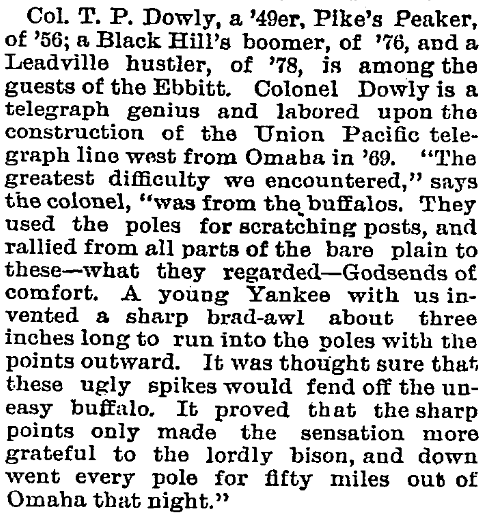
Excerpt from “In Hotel Lobbies,” The Washington Post, January 24, 1890.
Col. T. P. Dowly, a ’49er, Pike’s Peaker, of ’56; a Black Hill’s boomer, of ’76, and a Leadville hustler, of ’78, is among the guests of the Ebbitt. Colonel Dowly is a telegraph genius and labored upon the construction of the Union Pacific telegraph line west from Omaha in ’69. “The greatest difficulty we encountered,” says the colonel, “was from the buffalos. They used the poles for scratching posts, and rallied from all parts of the bare plain to these — what they regarded — Godsends of comfort. A young Yankee with us invented a sharp brad-awl about three inches long to run into the poles with the points outward. It was thought sure that these ugly spikes would fend off the uneasy buffalo. It proved that the sharp points only made the sensation more grateful to the lordly bison, and down went every pole for fifty miles out of Omaha that night.”
January 29, 1890: James O’Beirne, Civil War veteran of New York’s “Irish Rifles” (and a guy who led a pretty interesting life) explains his personal cure for the flu.
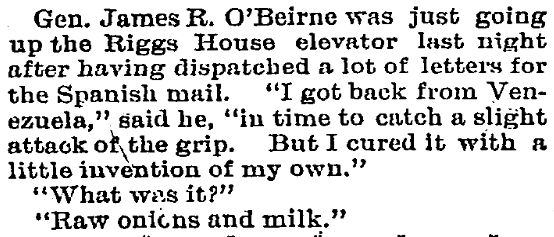
Excerpt from “In Hotel Lobbies,” The Washington Post, January 29, 1890.
Gen. James R. O’Beirne was just going up the Riggs House elevator last night after having dispatched a lot of letters for the Spanish mail. “I got back from Venezeuela,” said he, “in time to catch a slight attack of the grip. But I cured it with a little invention of my own.”
“What was it?”
“Raw onions and milk.”
April 25, 1890: Thirty years before the Eighteenth Amendment brings Prohibition to the entire nation, S.W. Rathbun explains how it is going to go down.
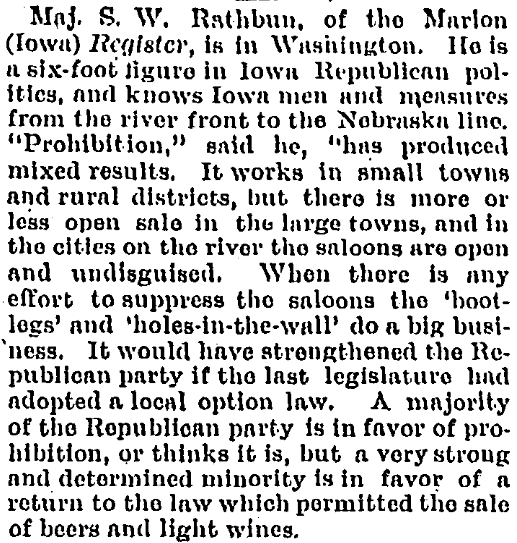
Excerpt from “In Hotel Lobbies,” The Washington Post, April 25, 1890.
Maj. S. W. Rathbun, of the Marion (Iowa) Register, is in Washington. He is a six-foot figure in Iowa Republican politics, and knows Iowa men and measures from the river front to the Nebraska line. “Prohibition,” said he, “has produced mixed results. It works in small towns and rural districts, but there is more or less open sale in the large towns, and in the cities on the river the saloons are open and undisguised. When there is any effort to suppress the saloons the ‘boot-legs’ and ‘holes-in-the-wall’ do a big business. It would have strengthened the Republican party if the last legislature had adopted a local option law. A majority of the Republican party is in favor of prohibition, or thinks it is, but a very strong and determined minority is in favor of a return to the law which permitted the sale of beers and light wines.”
May 3, 1890: Meet Ira Barnett of Louisville, Kentucky. He’s a pretty big wheel down at the cracker factory.
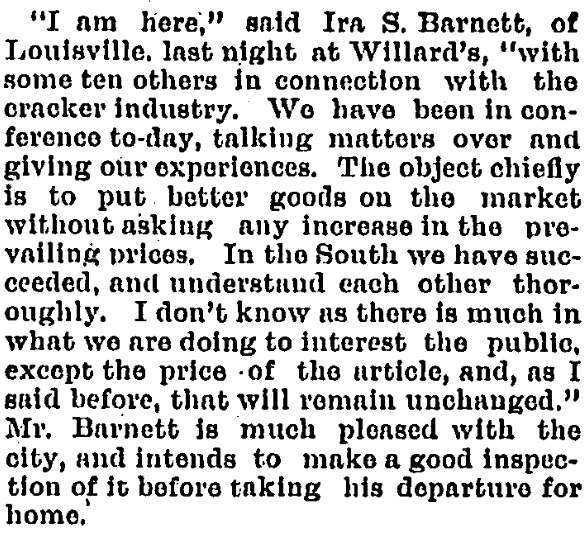
Excerpt from “In Hotel Lobbies,” The Washington Post, May 3, 1890.
“I am here,” said Ira S. Barnett, of Louisville, last night at Willard’s, “with some ten others in connection with the cracker industry. We have been in conference to-day, talking matters over and giving our experiences. The object chiefly is to put better goods on the market without asking any increase in the prevailing prices. In the South we have succeeded, and understand each other thoroughly. I don’t know as there is much in what we are doing to interest the public, except the price of the article, and, as I said before, that will remain unchanged.” Mr. Barnett is much pleased with the city, and intends to make a good inspection of it before taking his departure for home.
June 1, 1890: Have you heard Confederate veteran J. L. Vandiver’s Civil War stories? Don’t worry; if you bump into him in a hotel lobby, you are going to.
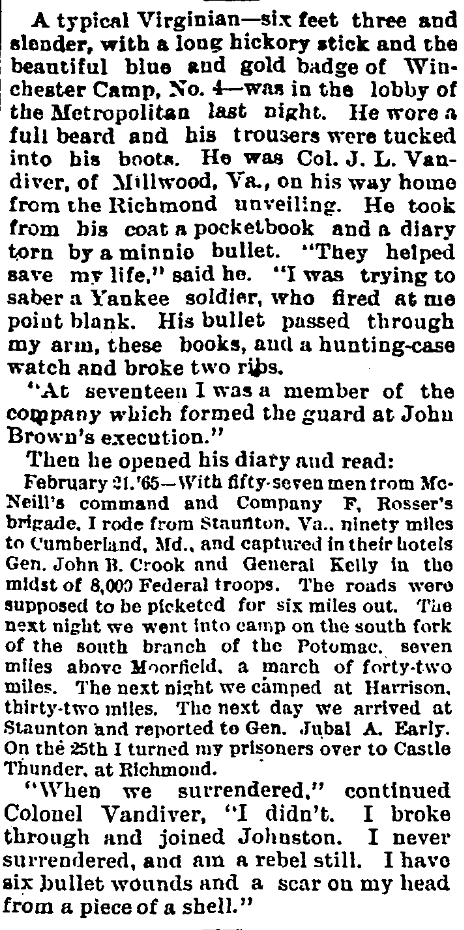
Excerpt from “In Hotel Lobbies,” The Washington Post, June 1, 1890.
A typical Virginian — six feet three and slender, with a long hickory stick and the beautiful blue and gold badge of Winchester Camp, No. 4 — was in the lobby of the Metropolitan last night. He wore a full beard and his trousers were tucked into his boots. He was Col. J. L. Vandiver, of Millwood, Va., on his way home from the Richmond unveiling. He took from his coat a pocketbook and a diary torn by a minnie bullet. “They helped save my life,” said he. “I was trying to saber a Yankee soldier, who fired at me point blank. His bullet passed through my arm, these books, and a hunting-case watch and broke two ribs.
“At seventeen I was a member of the company which formed the guard at John Brown’s execution.”
Then he opened his diary and read:
February 21. ’65 — With fifty-seven men from McNeill’s command and Company F, Rosser’s brigade, I rode from Staunton, Va., ninety miles to Cumberland, Md., and captured in their hotels Gen. John B. Crook and General Kelly in the midst of 8,000 Federal troops. The roads were supposed to be picketed for six miles out. The next night we went into camp on the south fork of the south branch of the Potomac, seven miles above Moorfield, a march of forty-two miles. The next night we camped at Harrison, thirty-two miles. The next day we arrived at Staunton and reported to Gen. Jubal A. Early. On the 25th I turned my prisoners over to Castle Thunder, at Richmond.
“When we surrendered,” continued Colonel Vandiver, “I didn’t. I broke through and joined Johnston. I never surrendered, and am a rebel still. I have six bullet wounds and a scar on my head from a piece of a shell.”
June 12, 1890: The manager of Willard’s Hotel explains that what Washington most desperately needs is a hotel that doesn’t suck.
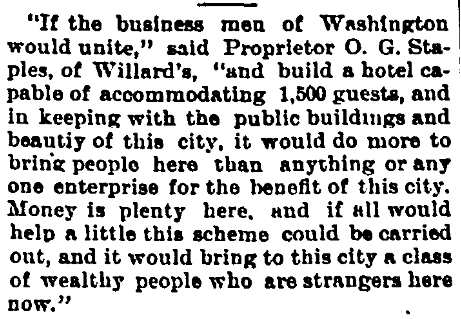
Excerpt from “In Hotel Lobbies,” The Washington Post, June 12, 1890.
“If the business men of Washington would unite,” said Proprietor O. G. Staples, of Willard’s, “and build a hotel capable of accommodating 1,500 guests, and in keeping with the public buildings and beauty of this city, it would do more to bring people here than anything or any one enterprise for the benefit of this city. Money is plenty here, and if all would help a little this scheme could be carried out, and it would bring to this city a class of wealthy people who are strangers here now.”
July 9, 1890: Charles A. Gordon of Mississippi offers an explanation for why African-Americans in his Jim Crow state don’t vote: they are lazy.
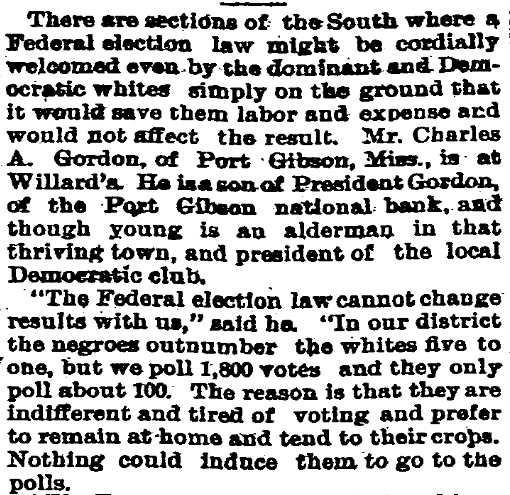
Excerpt from “In Hotel Lobbies,” The Washington Post, July 9, 1890.
There are sections of the South where a Federal election law might be cordially welcomed even by the dominant and Democratic whites simply on the ground that it would save them labor and expense and would not affect the result. Mr. Charles A. Gordon, of Port Gibson, Miss., is at Willard’s. He is a son of President Gordon, of the Port Gibson national bank, and though young is an alderman in that thriving town, and president of the local Democratic club.
“The Federal election law cannot change results with us,” said he. “In our district the negroes outnumber the whites five to one, but we poll 1,800 votes and they only poll about 100. The reason is that they are indifferent and tired of voting and prefer to remain at home and tend to their crops. Nothing could induce them to go to the polls.
July 16, 1890: Moses Handy came all the way from Philadelphia just to get his booze on.

“In Hotel Lobbies.” The Washington Post, July 16, 1890.
Col. Moses P. Handy ran over from Philadelphia yesterday to escape heat and ennui. He stops at Chamberlin’s, where large stocks of coolness and ennui-dispellers are kept constantly on ice.
July 20, 1890: J.C. McKibben of Florida predicts that, one day, growing oranges in that state will be big business.
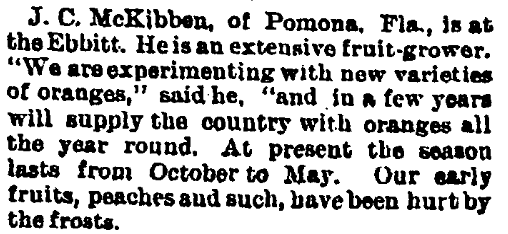
Excerpt from “In Hotel Lobbies,” The Washington Post, July 20, 1890.
J.C. McKibben, of Pomona, Fla., is at the Ebbitt. He is an extensive fruit-grower. “We are experimenting with new varieties of oranges,” said he, “and in a few years will supply the country with oranges all the year round. At present the season lasts from October to May. Our early fruits, peaches and such, have been hurt by the frosts.
August 13, 1890: Never share a hotel suite with a political opponent, no matter how much you like him personally.
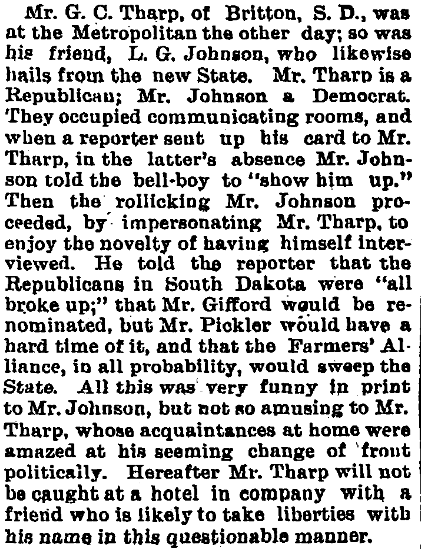
Excerpt from “In Hotel Lobbies,” The Washington Post, August 13, 1890.
Mr. G. C. Tharp, of Brtton, S.D., was at the Metropolitan the other day; so was his friend, L. G. Johnson, who likewise hails from the new State. Mr. Tharp is a Republican; Mr. Johnson a Democrat. They occupied communicating rooms, and when a reporter sent up his card to Mr. Tharp, in the latter’s absence Mr. Johnson told the bell-boy to “show him up.” Then the rollicking Mr. Johnson proceeded, by impersonating Mr. Tharp, to enjoy the novelty of having himself interviewed. He told the reporter that the Republicans in South Dakota were “all broke up;” that Mr. Gifford would be renominated, but Mr. Pickler would have a hard time of it, and that the Farmers’ Alliance, in all probability, would sweep the State. All this was very funny in print to Mr. Johnson, but not so amusing to Mr. Tharp, whose acquaintances at home were amazed at his seeming change of front politically. Hereafter Mr. Tharp will not be caught at a hotel in company with a friend who is likely to take liberties with his name in this questionable manner.
August 19, 1890: Caleb Walton West, former governor of the Utah Territory, explains that the days when the Mormons ran Utah are pretty much over.
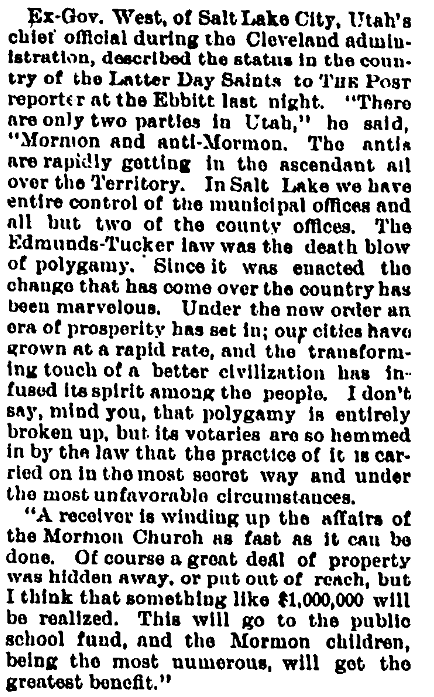
Excerpt from “In Hotel Lobbies,” The Washington Post, August 19, 1890.
Ex-Gov. West, of Salt Lake City, Utah’s chief official during the Cleveland administration, described the status in the country of the Latter Day Saints to THE POST reporter at the Ebbitt last night. “There are only two parties in Utah,” he said, “Mormon and anti-Mormon. The antis are rapidly getting in the ascendant all over the Territory. In Salt Lake we have entire control of the municipal offices and all but two of the county offices. The Edmunds-Tucker law was the death blow of polygamy. Since it was enacted the change that has come over the country has been marvelous. Under the new order an era of prosperity has set in; our cities have grown at a rapid rate, and the transforming touch of a better civilization has infused its spirit among the people. I don’t say, mind you, that polygamy is entirely broken up, but its votaries are so hemmed in by the law that the practice of it is carried on in the most secret way and under the most unfavorable circumstances.
“A receiver is winding up the affairs of the Mormon Church as fast as it can be done. Of course a great deal of property was hidden away, or put out of reach, but I think that something like $1,000,000 will be realized. This will go to the public school fund, and the Mormon children, being the most numerous, will get the greatest benefit.”
August 23, 1890: “Leading lawyer” James Hamilton of Mississippi assures the reporter that, while Mississippians naturally want to keep African-Americans from voting, they would never do anything to achieve that end as outlandish as extending the vote to women.
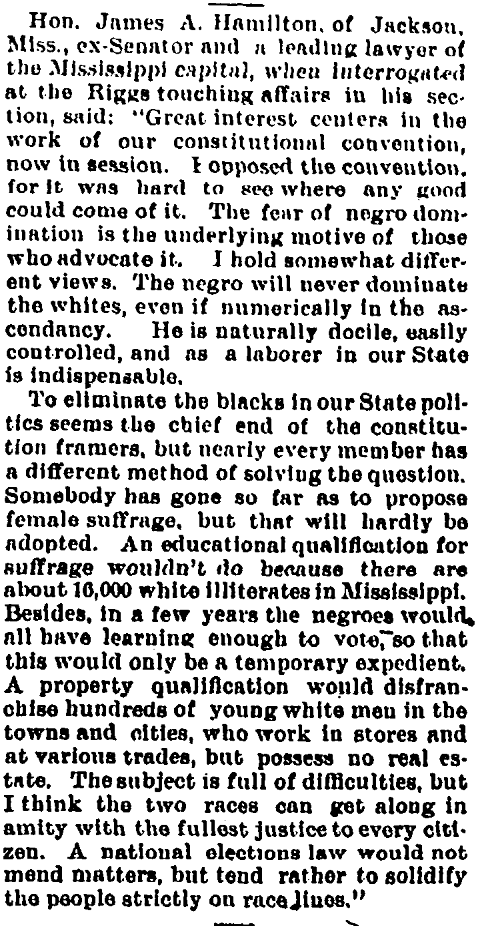
Excerpt from “In Hotel Lobbies,” The Washington Post, August 23, 1890.
Hon. James A. Hamilton, of Jackson, Miss., ex-Senator and a leading lawyer of the Mississippi capital, when interrogated at the Riggs touching affairs in his section, said: “Great interest centers in the work of our constitutional convention, now in session. I opposed the convention, for it was hard to see where any good could come of it. The fear of negro domination is the underlying motive of those who advocate it. I hold somewhat different views. The negro will never dominate the whites, even if numerically in the ascendancy. He is naturally docile, easily controlled, and as a laborer in our State is indispensable.
To eliminate the blacks in our State politics seems the chief end of the constitution framers, but nearly every member has a different method of solving the question. Somebody has gone so far as to propose female suffrage, but that will hardly be adopted. An educational qualification for suffrage wouldn’t do because there are about 16,000 white illiterates in Mississippi. Besides, in a few years the negroes would all have learning enough to vote, so that this would only be a temporary expedient. A property qualification would disenfranchise hundreds of young white men in the towns and cities, who work in stores and at various trades, but possess no real estate. The subject is full of difficulties, but I think the two races can get along in amity with the fullest justice to every citizen. A national elections law would not mend matters, but tend rather to solidify the people strictly on race lines.”
September 2, 1890: Jacob Augustus Geissenhainer, Congressman from New Jersey, loses his hat. And the Post is on it.
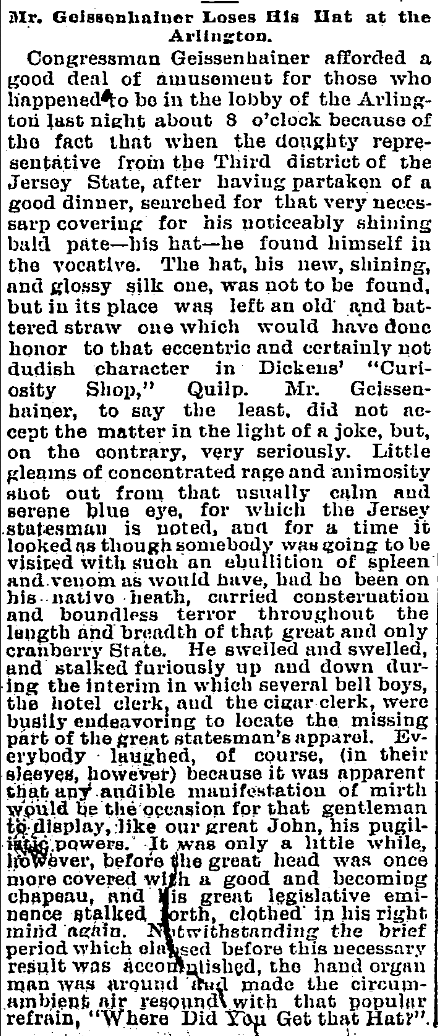
Excerpt from “In Hotel Lobbies,” The Washington Post, September 2, 1890.
Mr. Gessenhainer Loses His Hat at the Arlington.
Congressman Gessenhainer afforded a good deal of amusement for those who happened to be in the lobby of the Arlington last night about 8 o’clock because of the fact that when the doughty representative from the Third district of the Jersey State, after having partaken of a good dinner, searched for that very necessary covering for his noticeably shining bald pate — his hat — he found himself in the vocative. The hat, his new, shining, and glossy silk one, was not to be found, but in its place was left an old and battered straw one which would have done honor to that eccentric and certainly not dudish character in Dickens’ “Curiosity Shop,” Quilp. Mr. Gessenhainer, to say the least, did not accept the matter in the light of a joke, but, on the contrary, very seriously. Little gleams of concentrated rage and animosity shot out from that usually calm and serene blue eye, for which the Jersey statesman is noted, and for a time it looked as though somebody was going to be visited with such an ebullition of spleen and venom as would have, had he been on his native heath, carried consternation and boundless terror throughout the length and breadth of that great and only cranberry State. He swelled and swelled, and stalked furiously up and down during the interim in which several bell boys, the hotel clerk, and the cigar clerk, were busily endeavoring to locate the missing part of the great statesman’s apparel. Everybody laughed, of course, (in their sleeves, however) because it was apparent that any audible manifestation of mirth would be the occasion for that gentleman to display, like our great John, his pugilistic powers. It was only a little while, however, before the great head was once more covered with a good and becoming chapeau, and his great legislative eminence stalked forth, clothed in his right mind again. Notwithstanding the brief period which elapsed before this necessary result was accomplished, the hand organ man was around and made the circumambient air resound with that popular refrain, “Where Did You Get that Hat?”
September 3, 1890: The appearance of a foreigner in a Washington hotel lobby never goes without mention.
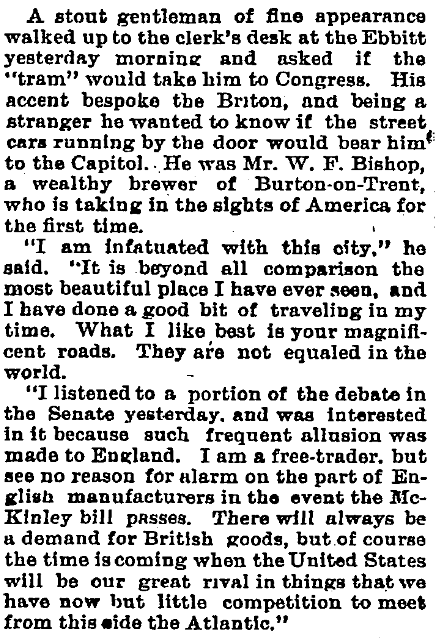
Excerpt from “In Hotel Lobbies,” The Washington Post, September 3, 1890.
A stout gentleman of fine appearance walked up to the clerk’s desk at the Ebbitt yesterday morning and asked if the “tram” would take him to Congress. His accent bespoke the Briton, and being a stranger he wanted to know if the street cars running by the door would bear him to the Capitol. He was Mr. W. F. Bishop, a wealthy brewer of Burton-on-Trent, who is taking in the sights of America for the first time.
“I am infatuated with this city,” he said. “It is beyond all comparison the most beautiful place I have ever seen, and I have done a good bit of traveling in my time. What I like best are your magnificent roads. They are not equaled in the world.
“I listened to a portion of the debate in the Senate yesterday, and was interested in it because such frequent allusion was made to England. I am a free-trader, but see no reason for alarm on the part of English manufacturers in the event the McKinley bill passes. There will always be a demand for British goods, but of course the time is coming when the United States will be our great rival in things that we have now but little competition to meet from this side of the Atlantic.”
September 20, 1890: Thomas Jones, newly elected Governor of Alabama, tells an antebellum hotel lobby story of his own.
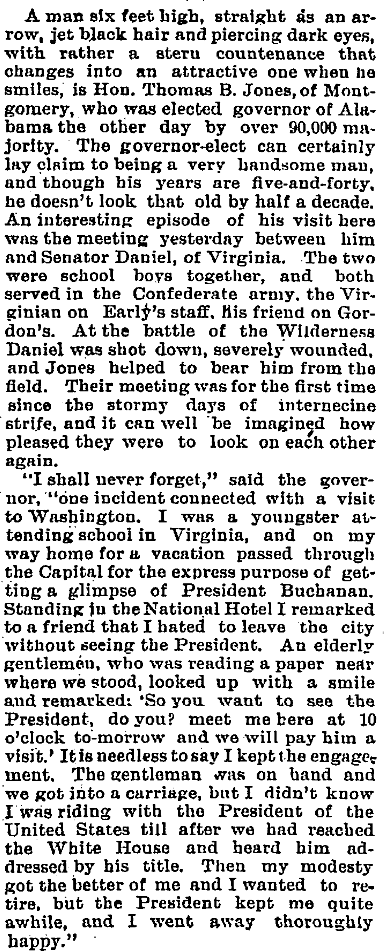
Excerpt from “In Hotel Lobbies,” The Washington Post, September 20, 1890.
A man six feet high, straight as an arrow, jet black hair and piercing dark eyes, with rather a stern countenance that changes into an attractive one when he smiles, is Hon. Thomas B. Jones, of Montgomery, who was elected governor of Alabama the other day by over 90,000 majority. The governor-elect can certainly lay claim to being a very handsome man, and though his years are five-and-forty, he doesn’t look that old by half a decade. An interesting episode of his visit here was the meeting yesterday between him and Senator Daniel, of Virginia. The two were school boys together, and both served in the Confederate army, the Virginian on Early’s staff, his friend on Gordon’s. At the battle of the Wilderness Daniel was shot down, severely wounded, and Jones helped to bear him from the field. Their meeting was for the first time since the stormy days of internecine strife, and it can well be imagined how pleased they were to look on each other again.
“I shall never forget,” said the governor, “one incident connected with a visit to Washington. I was a youngster attending school in Virginia, and on my way home for a vacation passed through the Capital for the express purpose of getting a glimpse of President Buchanan. Standing in the National Hotel I remarked to a friend that I hated to leave the city without seeing the President. An elderly gentleman, who was reading a paper near where we stood, looked up with a smile and remarked: ‘So you want to see the President, do you? Meet me here at 10 o’clock to-morrow and we will pay him a visit.’ It is needless to say I kept the engagement. The gentleman was on hand and we got into a carriage, but I didn’t know I was riding with the President of the United States till after we had reached the White House and I heard him addressed by his title. Then my modesty got the better of me and I wanted to retire, but the President kept me quite awhile, and I went away thoroughly happy.”
October 11, 1890: The Post throws some shade at visiting writer Laura Jean Libbey, the E.L. James of her day.
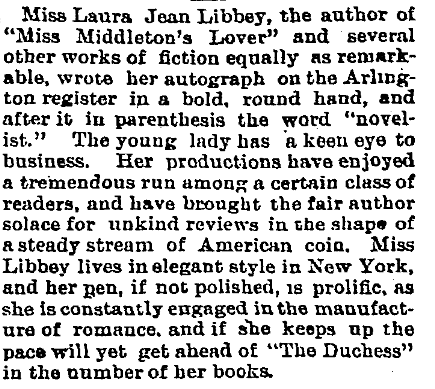
Excerpt from “In Hotel Lobbies,” The Washington Post, October 11, 1890.
Miss Laura Jean Libbey, the author of “Miss Middleton’s Lover” and several other works of fiction equally remarkable, wrote her autograph on the Arlington register in a bold, round hand, and after it in parenthesis the word “novelist.” The young lady has a keen eye to business. Her productions have enjoyed a tremendous run among a certain class of readers, and have brought the fair author solace for unkind reviews in the shape of a steady stream of American coin. Miss Libbey lives in elegant style in New York, and her pen, if not polished, is prolific, as she is constantly engaged in the manufacture of romance, and if she keeps up the pace will yet get ahead of “The Duchess” in the number of her books.
November 14, 1890: Spoiler alert — as of the 2010 census, the current population of Buena Vista, Virginia is 6,650.
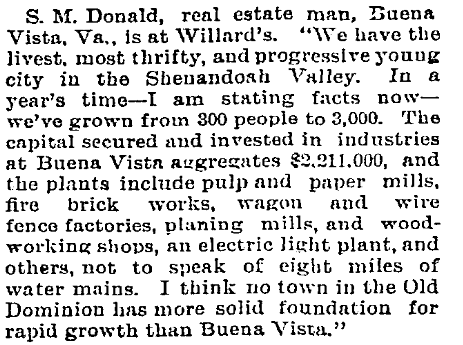
Excerpt from “In Hotel Lobbies,” The Washington Post, November 14, 1890.
S. M. Donald, real estate man, Buena Vista, Va., is at Willard’s. “We have the livest, most thrifty, and progressive young city in the Shenandoah Valley. In a year’s time — I am stating facts now — we’ve grown from 300 people to 3,000. The capital secured and invested in industries at Buena Vista aggregates $2,211,000, and the plants include pulp and paper mills, fire brick works, wagon and wire fence factories, planing mills, and woodworking shops, an electric light plant, and others, not to speak of eight miles of water mains. I think no town in the Old Dominion has more solid foundation for rapid growth than Buena Vista.”
November 15, 1890: A former House member laments the tendency of modern voters to think for themselves. (Some things never change.)
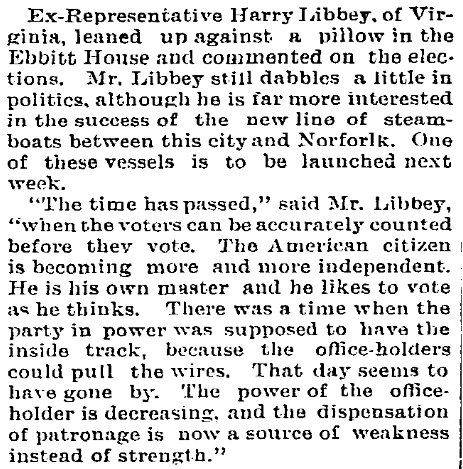
Excerpt from “In Hotel Lobbies,” The Washington Post, November 15, 1890.
Ex-Representative Harry Libbey, of Virginia, leaned up against a pillow in the Ebbitt House and commented on the elections. Mr. Libbey still dabbles a little in politics, although he is far more interested in the success of the new line of steamboats between this city and Norfolk. One of these vessels is to be launched next week.
“The time has passed,” said Mr. Libbey, “when the voters can be accurately counted before they vote. The American citizen is becoming more and more independent. He is his own master and he likes to vote as he thinks. There was a time when the party in power was supposed to have the inside track, because the office-holders could pull the wires. That day seems to have gone by. The power of the office-holder is decreasing, and the dispensation of patronage is now a source of weakness instead of strength.
